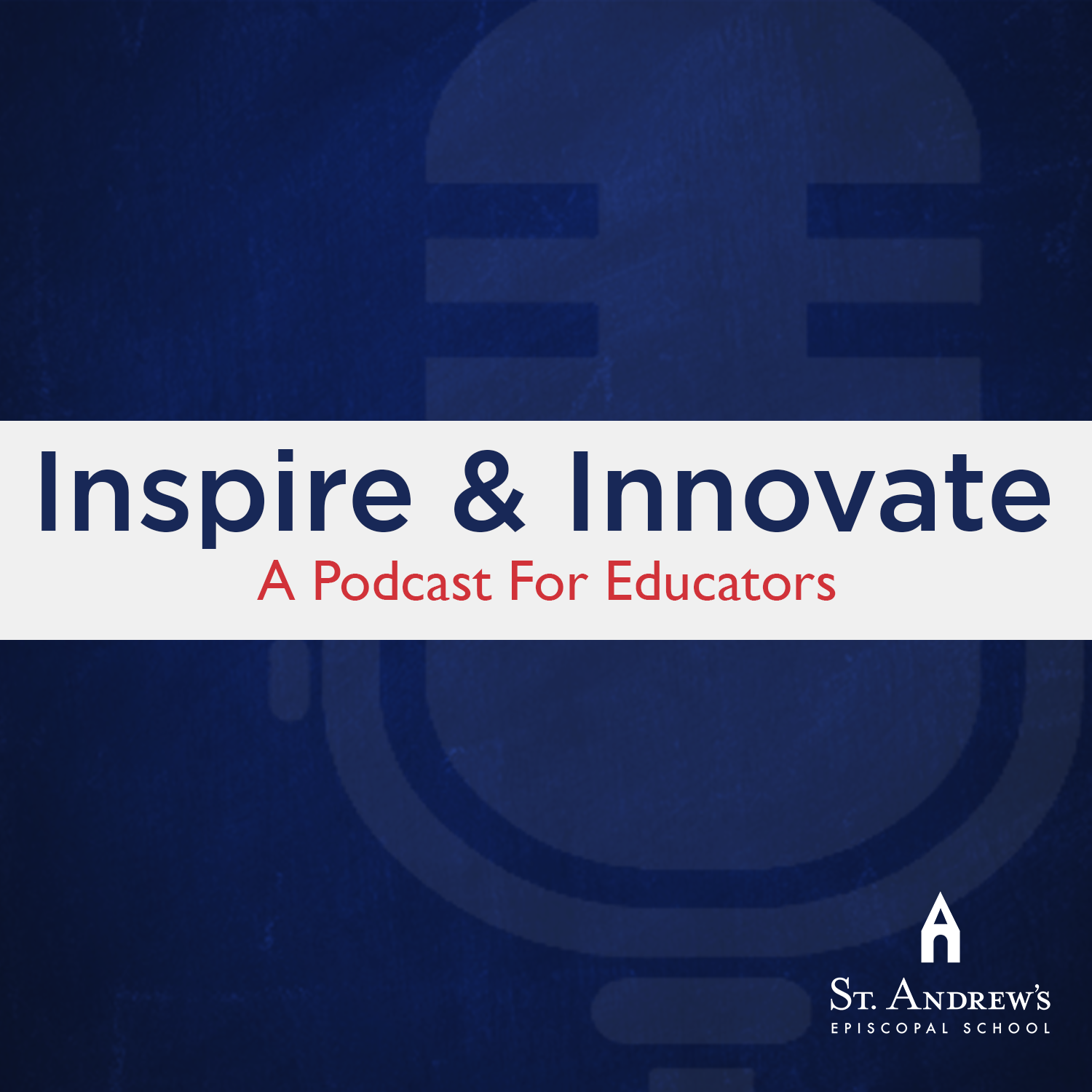Episodes

Monday May 17, 2021
Teacher Talks: Michael Nachbar
Monday May 17, 2021
Monday May 17, 2021
OurTeacher Talks companion podcast...this week, Julie Rust interviews three amazing upper school educators….Wesley Saylor, Nancy Rivas, Gracie Bellnap.

Monday May 10, 2021
Centering Relevance (ft Charlie Jenkinson)
Monday May 10, 2021
Monday May 10, 2021
This week’s Inspire & Innovate Podcast features guest, Charlie Jenkinson, serves as the Chief Strategy Officer for the World Leading Schools Association (WLSA). He believes that “schools have responsibility to act as powerhouses of social and global mobility” and he leads with a vision of ever-broadening access to and transformation of our educational spheres. During our conversation, we discussed
- How Charlie’s experience as a student led to his drive to transform the system of education . . . and why extrinsic motivation never worked for him (4:10-7:28)
- Why this transformative work cannot be the sole responsibility of individual teachers or even individual schools . . . a network is required (7:29-8:00; 18:10-18:53; 25:35-26:54)
- A powerful example of why simply developing individual, measurable skills and performance is not enough for transformative teaching/learning (8:02-9:02)
- How WLSA is fighting for equity and access for all youth to learn, travel, and develop as global citizens through the acquisition of intercultural lenses and working toward change (13:58-16:30; 53:56-55:50)
- Why the pandemic makes all of these commitments more important and more timely than ever (16:30-17:55)
- The kinds of experiences youth need to thrive: featuring (in part) the double helix of “a deep understanding of what they offer the world and what does the world need from [them]” (22:08-25:35)
- The influence individual teachers and schools can have (26:54-28:58)
- Charlie’s philosophy about the utilization of literature in schools in relation to student interest and faculty expertise (28:58-31:58)
- A new phrase (and literacy practice) to incorporate into your vernacular, thanks to Charlie’s dad: “reading ‘round your subjects” (32:40-36:12)
- How an individual school can best contribute to a network of schools, and why those of us in the Jackson, MS area are uniquely positioned to provide youth opportunities to study and make sense of civil rights in the US (38:30-41:25)
- The definition of intercultural intelligence and why it has more to do with math class than you might think (41:31-48:25)
- Why a combination of a proactive and responsive curricula is key for older youth (48:26-51:33)
- Why your ability to connect personally/relationally with your students is the part that really sticks with them (56:35-58:36)
- The book that Charlie Jenkinson thinks all educators should read (1:00:18-1:00:01:46)
Don’t forget to also tune in to our Teacher Talks companion podcast . . . this week I interview two St. Andrew’s superstars that both teach and fill a variety of other central roles at our school: Kate Dutro (our lower school librarian) and Rev. Annie Elliott (chaplain, upper school teacher). They help us unpack Charlie’s interview in some profound ways, so don’t miss it!

Monday May 10, 2021

Monday May 03, 2021
Centering Curiosity (Ft Julie Mountcastle)
Monday May 03, 2021
Monday May 03, 2021
We’re back on another Tuesday with another podcast drop: this week featuring Julie Mountcastle, simultaneously Head of School and Grade 2 / 3 Teacher at Slate School, a K-12 independent school located in North Haven, Connecticut. Julie has been a teacher for nearly 20 years and has taught every elementary grade level and worked in both traditional and project-based classrooms. Passionate about reimagining elementary education, Julie has extended her collaborative and creative energy to every aspect of Slate School, including the development of the curriculum, the school and building design, the integration of the arts into every day, the school’s mission steeped in curiosity-driven education, and sharing that mission with the world . . . even (especially so) during this strange past year. Highlights of our conversation with Julie include:
- How Julie’s less-than-inspiring experience in her own K-12 journey, her love for theater, and having children of her own ignited a passion for her to make changes in schools (3:15-5:41; 6:43-8:59)
- A day in the life of someone who really does seem to do it all . . . and why you should incorporate 7am “infinity fun” into your day . . . (9:30-13:48)
- How to find “your people” in your school organization and why it’s worth the time to prioritize sharing your teaching craft with work buddies (13:58-16:30)
- Julie’s number one collaborators . . . (hint- they haven’t yet hit the double digits in age!) and how she engages them in personal passion projects to follow their curiosity (16:30- 17:30)
- Slate School’s unique student-led, interdisciplinary, nature-situated philosophy toward education . . . (18:44-23:54)
- How passion project sharing can help all young children “stumble upon” their interests along the way and how kids that know so much about one thing can find a way to connect to everything else (25:23-27:40)
- Why it’s important to communicate our philosophy the parents of the youth we teach (27:43-31:28)
- A (pretty glorious) day in the life of a second grader at Slate School . . . now and pre-pandemic (31:22- 41:15)
- How all of us, even those from the most traditionally structured schools, can scooch our way closer to the direction Julie describes . . and how simple tweaks can make a day “a day a kid never forgets” (42:35-44:51)
- Why we should center class activities with questions that inspire our own curiosity as adults (44:55-44:53)
- How the pandemic has distilled priorities and recentered compassion (46:30-50:18)
- When adults should intervene in student-centered moments, why sometimes “when things are going sideways we should step back,” and a call to avoid the tendency to “squeeze youth tighter” as they grow more capable. (50:33-54:34)
- Why assessment is a sticky issue they are still considering as they conceive of their upcoming high school (54:35-56:18)
- Why Julie’s favorite teacher was actually a student (57:26-58:13)
- The one book Julie thinks every teacher should read . . . and why we should never settle and should always pursue what gives us joy. (58:48-60:37)
Don’t forget to also tune in to our Teacher Talks companion podcast . . . this week’s features Shea Egger interviewing three educators of young (and not so young) children: PK3 educator Lea Crongeyer, first grade teacher Mary McCall McArthur, and fifth grade teacher Toby Lowe.

Monday May 03, 2021

Monday Apr 26, 2021
Centering Relationships (Ft. Ian Symmonds)
Monday Apr 26, 2021
Monday Apr 26, 2021
Inspire & Innovate: A Podcast for Educators is excited to release our second set of episodes about this unique moment in the education landscape featuring the ideas and expertise of consultant, author, and ed-activist, Ian Symmonds.
- Why would we hang on to a model of education that is so stuck in the past? (5:15-6:05)
- Three characteristics of schools that’ve positioned themselves to be innovative and forward-thinking, meeting the ever-changing needs of society. (6:45-10:43)
- Schools working together for change collaboratively rather than competitively (10:45-11:42)
- Three seasons or trimesters of the pandemic (13:20-16:40)
- Key components classroom teachers should carry forward as we emerge from this pandemic: relational learning and using technology to personalize education rather than access education (16:40-19:36)
- Building an authentic connection with the community around schools that expand past families we serve; how Sesame Street got a lot right (20:15-24:50)
- Redefining what community means (24:55-25:54)
- Ian’s Just Cause campaign and wisdom from Bono: “Helping someone reach their potential is the biggest act of love.” (25:55-29:30)
- Reimagining high school graduation requirements and changes in college and university admissions; “We are in the business of helping kids discern their future.” (31:30-35:50)
- Examples of innovative ideas in schools and the classroom: institutionalizing the use of outdoor spaces & increased parental involvement via community events (36:30-39:20)
- Why teachers are better aware of the “kitchen table conversations” these days and how this relates to game-changers in student wellness (39:20- 40:55)
- “Transparency is the best thing”: How virtual learning counterintuitively has given us more transparency, making things more natural between one another and promoting our awareness for student wellness (42:25-43:55)
- Ian shares who his favorite teacher (K-12) was and why. (44:10-46:10)
- What book(s) Ian Symmonds would recommend all teachers read (46:18-48:20)
Don’t forget to also tune in to our Teacher Talks companion podcast in which Toby Lowe interviews Virginia Buchanan, Emmi Sprayberry, and Nicole Robinson about how these themes of relational learning, creative classroom spaces, and community outreach show up in their classrooms!

Monday Apr 26, 2021

Friday Apr 16, 2021
Centering Students (Ft John Spencer)
Friday Apr 16, 2021
Friday Apr 16, 2021
This week, we release our first interview, “Centering Students” with John Spencer, best-selling author of Launch and Vintage Innovation which features cutting-edge ideas around fostering active learning experiences for students of all ages.
Highlights from our conversation with John Spencer include:
- How working in the nonprofit sector unexpectedly led John Spencer into the field of education (2:50-4:55)
- The “deeply human drive to learn and to create, to make . . . whether it’s kindergarteners or graduate students and . . the common fears we all experience.” (5:20- 5:50)
- What “failing forward” has looked and felt like for those teaching during a pandemic . . . and how relevant the “hero’s journey” might be for all of us right now. (6:01-8:35)
- How important it is that a school’s culture, systems, and leadership allow for growth via mistakes; “you’ve got to provide slack to develop grit.” ; try out “the daily epic fail” in your classroom! (8:35-14:30)
- Why grace matters this year, not just for students but also for faculty. Try this: make a t-chart of all of the permissions you’ve given to students and then do the same thing for yourself . . . and think back to how far you’ve come since March 2020. (18:20-22:40)
- How teaching is like weight training, and how to determine whether we need more reps or a season of rest/healing as we move into the 2021-2022 school year. (23:00-24:30)
- What have our students lost . . . and gained this past year (24:30 -25:52)
- How it has been simultaneously more challenging and easier to incorporate design-based thinking, project-based, LAUNCH processes in virtual or hybrid classes this past year (26:35-29:52)
- For those new to more student-centered approaches, how to incorporate some of these principles into our more traditional pedagogies in a low-risk gradual way. . . and why this is the perfect time to try them out! (30:20-32:35)
- What will “come back” in our teaching practice as we return to more in-person experiences . . . gardens, Socratic seminars, cardboard prototyping, all mashed up with digital tools as well! (e.g. Vintage Innovation) (32:55- 34:32)
- Why we should all be asking ourselves: “What are the things that we did differently this past year that we will continue to incorporate?” (37:12-37:37)
- What book(s) John Spencer would recommend all teachers read (40:40- 41:16)

Friday Apr 16, 2021

